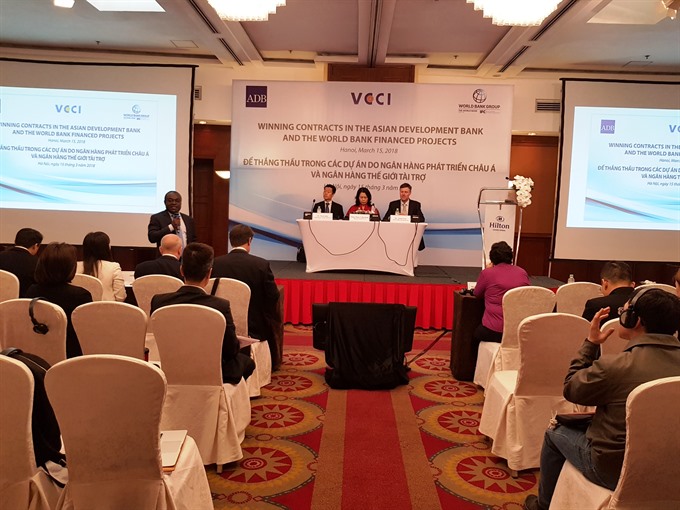Vietnamese businesses should actively seek information and grasp the development and investment strategies of banks to win bids for projects financed by the World Bank (WB) and Asian Development Bank (ADB), said representatives of the two banks on Thursday.

Vietnamese businesses should actively seek information and grasp the development and investment strategies of banks to win bids for projects financed by the World Bank (WB) and Asian Development Bank (ADB), said representatives of the two banks on Thursday.
The information was released in Ha Noi at the workshop entitled “Winning Contracts in the Asian Development Bank and the World Bank Financed Projects” co-hosted by the two banks and the Viet Nam Chamber of Commerce and Industry (VCCI).
Achim Fock, Portfolio & Operations Manager in the World Bank office in Viet Nam, said the workshop aimed to share information for Vietnamese enterprises to gain access to WB and ADB financed projects. It also updated regulations on bidding and methods to prepare the tender, in order to help enterprises gain the capacity to win the bids.
There are currently 47 projects in various sectors, with the largest investment being related to infrastructure such as construction, water supply and drainage and transport.
It is expected that in the 2018-20 period, the WB will lend Viet Nam about US$4 billion, according to Achim.
Head of Project Administration Unit of ADB in Viet Nam Steven Schipani said the ADB would focus more on transport, energy and water supply this year. Capital would focus on the transport sector, he said, but would not be small for other sectors.
The total capital of all ADB projects in Viet Nam as of March 2018 was 59 projects with a total capital of US$7.5 billion, of which $3.5 billion had not yet been disbursed, so Vietnamese companies would have many opportunities to join ADB-financed projects, Steven said.
At the workshop, World Bank’s representative introduced new features in the bidding framework that is applied by both the WB and the ADB.
The new policy framework will minimise risk by providing more options and tools, increasing efficiency by offering tailored procurement mechanisms that are applicable to all types of tender. The banks’ core procurement principles include fairness, transparency, efficiency, fit for purpose, value of money and integrity.
"For the first time, the two Banks will allow any contract award decisions to be based on criteria other than lowest price, including quality and sustainability and has significantly improved the approach to resolving procurement-related complaints," Achim said.
How to win bid?
According to Luu Hong Giang, deputy general director of Bach Dang Construction Corporation, which has participated in many projects funded by the WB and ADB, in comparison with foreign companies, Vietnamese enterprises have an advantage because they are active in soliciting the labour force.
However, it is common for domestic bidders to be unable to participate in large scale projects administered by the two banks. "We still have limited financial capacity, construction and administration," said Giang.
In addition, the evaluation criteria of the previous technical dossier are not clear and detailed, so many businesses struggle to compile bidding dossiers.
"However, at the present, with the new procurement policy framework, these problems are basically handled. Domestic contractors can fully compete with foreign contractors when taking part in international biddings," said Giang.
Steven said that enterprises seeking bids must understand the requirements of bidding documents and ensure they meet such requirements. With large WB and ADB contracts, businesses can set up joint ventures or use subcontractors, considering individual consultancy services to gain experience and build capacity profiles.
He said it was important to ask the investor for feedback after being rejected for a bid, in order to learn from mistakes and draw experiences to succeed in the future.
"Vietnamese enterprises need to be more active," Steven stressed.
Chairwoman of VCCI’s Science and Technology Council Pham Thi Hang said the improvements in the bidding mechanism were completed with significant contribution from the Viet Nam Party and State, allowing private enterprises to access ODA capital resources and learn more about financial institutions and the processes of WB and ADB procurement. — VNS





